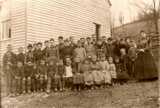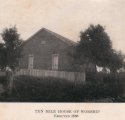
Tapering Point to the right, Glencoe to the left
 |
 |
|
| One Room School, Napoleon, 1918 (list of students, here) |
Napoleon School, 1913 A partial list of the kids is here. |
Most likely Eagle Tunnel School Frank and Ed Connely are in the picture, but we can't identify others. If you can, drop us an email, please. Just click on "Contact Me" below. |
 |
 |
 |
 |
|
| name key | name key | name key | name key | |
| These are one room school pictures in and around Napoleon, from say 1890 through 1900 | ||||
The Hendrix / Mountjoy farm house
It was south of “downtown” Napoleon, on 16.
![]()
| “Napoleon, a thriving village is situated 2 1/2 miles from the L. C. & L. R. R., 2 1/2 miles from the beautiful Ohio. Business lively, consequently trade is extensive. . . . Last Saturday. P. M. Lusley's skating rink was adorned with the most graceful skaters of this place.” from the Newport Local, January 30, 1879 |
![]()
 |
 |
| Building the Ten Mile Steeple | Ten Mile House of Worship |
Any discussion of the history of churches in Gallatin County begins with this church, Napoleon's Ten Mile
Baptist, which dates back to 1804. The complete text of the 1904 centennial history
of the church is here.
Not to be confused with the Ten Mile Association of Baptist Churches, more on which is here (pdf).
There's a church in Illinois named after Ten Mile, at this site.
There's also a church and a town in Lewis County, Missouri named for Ten Mile, founded by the son of David Lillard.
This train's going south, thru Eagle Tunnel, October 30, 1983, before the tunnel was “daylighted.”
This image is a copyrighted photo by Don Faris; clicking on the picture will take you to
railpics.net, where the full-size original resides.
![]()
| Napoleon was formally established in 1841. | Napoleon's two nonagenarians. |
| “Mr. Jake Hughes, our clever telephone magnate is arranging to build a line from Napoleon, Gallatin County to connect with this system at Berkshire, near the county line, which, when built, will afford admirable telephonic facilities between old Boone and Gallatin counties.” Boone County Recorder, February 6, 1901 | |
| The Sons of Temperance establish Chapter 260 in Napoleon in 1852. | Lynching feared. |
| It's 1851, and Napoleon citizens meet to discuss a railroad. Story here. | |
| There is a book you can see at Google Books,
of the Minutes of the United Presbyterian Church in the U.S.A. (search for Napoleon, KY and Presbyterian). There's a volume from 1842 and one from 1845. Both seem to have a listing for a Presbyterian Church in Napoleon. There were new and old school factions in the Presbyterian Church in the 19th century. Napoleon had an old school Presbyterian Church, here. |
|
| “Napoleon has been quite lively in the way of amusements. Prof. Tucker, the renowned juggler, gave an entertainment at the Opera House Saturday night. A large attendance.”From Covington’s Daily Commonwealth, August 7, 1879 | The hotel owned by Mr. B. H. Elliston, in Napoleon, Ky., was entirely consumed by fire on the 26th ult. Loss estimated at $3000. Pennsylvania Inquirer, January 10, 1842 |
| “H. F. Wood, a clever gentleman and merchant of Napoleon was here yesterday on business
Monday. He has just completed a nice two-story building on the site of his old store that burned down on January 15th, and will shortly begin business. The upper floor will be used for lodge purposes.” from the Walton Advertiser, April 1, 1916 |
|
| “From the mail agent on the steamer Major Anderson we learn that the
Federal picket in the vicinity of Warsaw, Ky., were fired up and
driven in yesterday, by a body of Secession cavalry. As soon
as the news reached Warsaw, a considerable force was dispatched to meet the enemy. When the mail boat left Warsaw, nothing had been heard from the expedition. General Leslie Combs is announced to speak at Napoleon, a small place in Gallatin County, back of Warsaw, today, and it was reported that the rebels have declared that if he attempts to speak, they will take him prisoner. There was considerable force of soldiers at Warsaw, and reinforcements were constantly arriving. Great excitement prevailed in consequence of the anticipated battle at Napoleon.” Cincinnati Daily Press, October 30, 1861 |
|

Cincinnati Daily Commercial, November 1, 1864. (And that's horses, not houses).
| The Civil War saw many renegade groups of men who, while claiming to be Confederate soldiers, were, in reality, horse thieves and plunderers. Jesse led such a band in the Gallatin-Carroll-Henry-Trimble area. |
![]()


